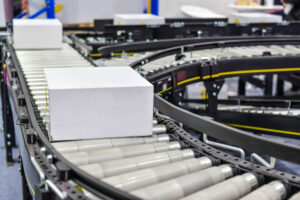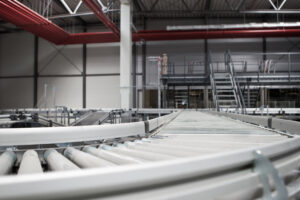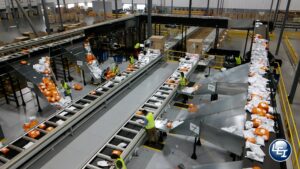Table of Contents
The traditional approach to conveyor system implementation is broken. Companies waste millions of dollars and months of time coordinating between multiple vendors, dealing with integration nightmares, and suffering through delayed project timelines that destroy ROI projections. Meanwhile, smart executives are discovering that turnkey conveyor systems eliminate these problems while delivering superior results at lower total costs.
Recent industry analysis reveals that companies implementing turnkey conveyor systems experience 40% faster project completion, 60% fewer integration issues, and 25% lower total project costs compared to traditional multi-vendor approaches. More importantly, turnkey conveyor systems deliver guaranteed performance from day one, eliminating the finger-pointing and blame-shifting that plague conventional installations.
At Lafayette Engineering, we’ve been perfecting turnkey conveyor systems for over 35 years, delivering complete solutions that transform operations while eliminating the headaches associated with traditional implementation approaches. Today, we’re sharing the insider knowledge that helps executives make informed decisions about turnkey conveyor systems that drive exceptional business results.
The Hidden Crisis of Traditional Conveyor System Implementation
Most companies dramatically underestimate the true cost and complexity of conventional conveyor system projects. What appears to be a straightforward equipment purchase becomes a management nightmare involving dozens of vendors, conflicting specifications, and integration challenges that can derail entire projects.
Vendor Coordination Disasters: Traditional projects require coordinating between mechanical equipment suppliers, electrical contractors, control system integrators, software developers, and installation teams. Each vendor blames others when problems arise, leaving facility managers to resolve conflicts while projects fall behind schedule.
Integration Nightmares: Connecting equipment from multiple vendors requires extensive custom engineering that often reveals incompatibilities discovered only during installation. These integration challenges can add months to project timelines and hundreds of thousands of dollars to budgets.
Performance Gaps: Without single-source accountability, traditional conveyor systems often fail to meet performance specifications due to optimization compromises between different vendors’ equipment. The result is systems that technically function but never achieve their promised efficiency levels.
Support Complexities: After installation, maintenance and support require coordinating between multiple vendors for different system components. When problems occur, determining responsibility becomes a time-consuming process that extends downtime and increases costs.
The Turnkey Conveyor Systems Advantage
Turnkey conveyor systems eliminate traditional implementation problems by providing complete solutions from a single source with guaranteed performance and unified support.
1. Single-Source Accountability
Turnkey conveyor systems provide one point of contact for design, engineering, installation, and support. This eliminates vendor coordination challenges while ensuring all components are optimized to work together for maximum performance.
When issues arise, there’s no finger-pointing or blame-shifting. The turnkey provider takes full responsibility for system performance and resolves problems quickly to minimize operational impact.
2. Optimized System Integration
Turnkey conveyor systems are designed from the ground up as integrated solutions rather than collections of individual components. This holistic approach enables optimization that’s impossible with multi-vendor implementations.
Every component—from mechanical conveyor sections to control systems to software interfaces—is selected and configured to maximize overall system performance rather than individual component specifications.
3. Guaranteed Performance Results
Turnkey conveyor systems come with comprehensive performance guarantees that cover throughput rates, accuracy levels, uptime targets, and efficiency metrics. If the system doesn’t meet specifications, the provider must make corrections at no additional cost.
This performance guarantee eliminates the risk of systems that technically function but fail to deliver promised business benefits.
4. Streamlined Project Management
Turnkey conveyor systems significantly simplify project management by reducing the number of vendors, interfaces, and potential failure points. This streamlined approach accelerates implementation while reducing management overhead.
Project timelines become more predictable because all work is coordinated by a single organization with complete control over all project elements.
Advanced Technologies in Modern Turnkey Conveyor Systems
Today’s turnkey conveyor systems incorporate cutting-edge technologies that enable performance levels impossible with traditional approaches.
Intelligent Control Systems
Modern turnkey conveyor systems utilize advanced PLC controls with sophisticated programming that optimizes performance in real-time. These systems continuously monitor operational parameters and automatically adjust settings to maintain peak efficiency.
Machine learning algorithms analyze historical performance data to predict and prevent problems before they impact operations. The result is turnkey conveyor systems that become more efficient over time through continuous optimization.
Integrated Sortation Technologies
Turnkey conveyor systems can incorporate high-speed sortation capabilities that automatically route products to correct destinations with 99.9% accuracy. These systems utilize advanced scanning, weighing, and dimensional checking to ensure perfect product identification and routing.
Multiple sortation technologies including sliding shoe sorters, tilt-tray systems, and cross-belt sorters can be seamlessly integrated into turnkey conveyor systems based on specific operational requirements.
Real-Time Performance Monitoring
Advanced monitoring systems provide complete visibility into turnkey conveyor system performance through intuitive dashboards and detailed analytics. Operators can monitor throughput rates, identify bottlenecks, and optimize performance through real-time adjustments.
Predictive analytics identify potential issues before they impact operations, enabling proactive maintenance that maximizes system uptime and performance.
Seamless Software Integration
Turnkey conveyor systems include comprehensive software integration with warehouse management systems (WMS), enterprise resource planning (ERP) platforms, and transportation management systems (TMS).
This integration ensures turnkey conveyor systems receive accurate routing information, inventory updates, and order priorities while providing real-time status updates to upstream and downstream systems.
Case Study: Turnkey Conveyor Systems Transform Distribution Operations
A major retail distribution company needed to triple their processing capacity while improving accuracy and reducing labor costs. Traditional multi-vendor approaches had failed to deliver promised results in previous projects, leading management to seek turnkey conveyor systems alternatives.
The Challenge: Increase distribution center capacity from 50,000 to 150,000 packages daily while improving accuracy from 97.5% to 99.5% and reducing labor requirements by 40%.
Our Turnkey Conveyor Systems Solution:
- Designed integrated conveyor and sortation system optimized for retail distribution
- Implemented advanced PLC controls with real-time optimization capabilities
- Integrated high-speed sortation with multiple validation points
- Provided comprehensive training and ongoing optimization support
Outstanding Results:
- 280% increase in processing capacity (achieved 140,000 packages daily)
- 99.7% accuracy rate exceeding target specifications
- 52% reduction in labor requirements
- $6.8 million annual operational savings
- Project completed 3 months ahead of schedule
- ROI achieved in 13 months
Strategic Implementation of Turnkey Conveyor Systems
Successful turnkey conveyor systems implementation requires systematic planning and execution that addresses both technical requirements and operational considerations.
Phase 1: Requirements Analysis and Solution Design
Turnkey conveyor systems projects begin with comprehensive analysis of operational requirements, facility constraints, and performance objectives.
Operational Assessment: Detailed analysis of current processes, throughput requirements, product characteristics, and growth projections to ensure turnkey conveyor systems meet both current and future needs.
Facility Evaluation: Complete evaluation of facility layout, structural capabilities, utility availability, and integration requirements with existing systems.
Performance Specifications: Development of detailed performance requirements including throughput rates, accuracy targets, uptime goals, and efficiency metrics that turnkey conveyor systems must achieve.
Solution Design: Creation of comprehensive system design that optimizes performance while meeting budget and timeline constraints.
Phase 2: Engineering and Pre-Installation Validation
Detailed engineering and validation ensure turnkey conveyor systems will perform as specified before installation begins.
Detailed Engineering: Complete mechanical, electrical, and software engineering with detailed drawings, specifications, and programming requirements.
Simulation Testing: Advanced computer simulation validates system performance and identifies potential issues before installation.
Component Testing: Critical components undergo factory testing to ensure they meet specifications and integrate properly with other system elements.
Installation Planning: Detailed installation plans minimize facility disruption while ensuring safe, efficient implementation.
Phase 3: Installation and Commissioning
Professional installation teams implement turnkey conveyor systems with minimal operational disruption while ensuring perfect performance from day one.
Phased Installation: Strategic installation approach maintains facility operations while new systems are implemented and tested.
System Integration: Comprehensive integration testing ensures all components work together optimally and interface correctly with existing systems.
Performance Validation: Extensive testing validates that turnkey conveyor systems meet all performance specifications before final acceptance.
Operator Training: Comprehensive training programs ensure operators can effectively utilize new systems and follow optimized procedures.
Measuring Turnkey Conveyor Systems Success
Effective turnkey conveyor systems must be measured through comprehensive metrics that demonstrate both operational improvements and financial returns.
Performance Metrics for turnkey conveyor systems include:
- Throughput Achievement: Actual vs. specified processing rates across all system components
- Accuracy Performance: Error rates and first-pass success rates for sorting and routing functions
- System Uptime: Percentage of scheduled operating time systems are productive and available
- Energy Efficiency: Power consumption per unit processed compared to baseline operations
- Labor Productivity: Output per worker-hour with new turnkey conveyor systems
- Space Utilization: Productive use of facility space enabled by optimized system design
Financial Metrics include:
- Project ROI: Return on investment from turnkey conveyor systems including all direct and indirect benefits
- Cost Per Unit: Total operational cost per unit processed through new systems
- Labor Cost Savings: Reduction in labor requirements and associated costs
- Quality Improvements: Cost savings from reduced errors, damage, and rework requirements
Industry Applications for Turnkey Conveyor Systems
Turnkey conveyor systems provide advantages across multiple industries, each with unique requirements and performance objectives.
E-Commerce and Fulfillment
E-commerce operations require turnkey conveyor systems that can handle enormous product variety with high-speed throughput and perfect accuracy. These systems must accommodate everything from small jewelry items to large appliances while maintaining consistent performance.
Seasonal demand fluctuations require turnkey conveyor systems that can scale capacity during peak periods like holiday shopping seasons while maintaining efficiency during normal operations.
Manufacturing and Assembly
Manufacturing facilities need turnkey conveyor systems that integrate seamlessly with production processes while handling diverse product types and assembly requirements.
Just-in-time manufacturing requires turnkey conveyor systems that coordinate with production schedules to deliver components precisely when needed while maintaining lean inventory levels.
Distribution and Wholesale
Distribution centers require turnkey conveyor systems that optimize space utilization while maximizing throughput and accuracy for diverse product mixes and customer requirements.
Cross-docking operations need turnkey conveyor systems that coordinate inbound and outbound transportation schedules while minimizing product handling and storage time.
Food and Beverage
Food processing facilities require turnkey conveyor systems that meet strict sanitation requirements while handling temperature-sensitive products and maintaining traceability throughout the process.
Specialized materials and cleaning requirements make turnkey conveyor systems particularly valuable for food applications where system integration and support are critical.
Advanced Features of Modern Turnkey Conveyor Systems
Leading turnkey conveyor systems incorporate sophisticated features that enable superior performance and operational flexibility.
Modular Scalability
Modern turnkey conveyor systems utilize modular designs that enable easy expansion and reconfiguration as operational requirements change. This scalability protects initial investment while enabling growth accommodation.
Modular components can be added, relocated, or reconfigured without major system overhauls, providing operational flexibility that adapts to changing business requirements.
Predictive Maintenance Integration
Advanced turnkey conveyor systems include predictive maintenance capabilities that monitor equipment condition and automatically schedule maintenance activities before failures occur.
This proactive approach minimizes unplanned downtime while optimizing maintenance costs through condition-based scheduling rather than arbitrary time intervals.
Energy Optimization
Modern turnkey conveyor systems incorporate energy-efficient components and intelligent controls that minimize power consumption while maintaining performance.
Variable frequency drives, LED lighting, and smart power management systems reduce operational costs while supporting corporate sustainability initiatives.
Safety Integration
Comprehensive safety systems are integrated throughout turnkey conveyor systems to protect workers while maintaining productivity. This includes emergency stops, safety interlocks, and automated safety monitoring.
Safety systems are designed to prevent accidents without unnecessarily interrupting operations, maintaining both worker protection and operational efficiency.
Selecting the Right Turnkey Conveyor Systems Provider
Choosing the right partner for turnkey conveyor systems implementation is critical for project success and long-term operational performance.
Technical Expertise and Experience
Look for providers with proven experience in turnkey conveyor systems across multiple industries and application types. Technical capabilities should include mechanical engineering, electrical systems, control programming, and software integration.
Review case studies and customer references that demonstrate successful turnkey conveyor systems implementations similar to your specific requirements.
Project Management Excellence
Turnkey conveyor systems implementation requires exceptional project management to coordinate all aspects of design, engineering, procurement, installation, and commissioning.
Providers should demonstrate strong project management capabilities with track records of on-time, on-budget project completion.
Comprehensive Support Services
Post-installation support is critical for maintaining turnkey conveyor systems performance throughout their operational life. Providers should offer comprehensive maintenance programs, performance monitoring, and continuous optimization services.
24/7 support availability ensures rapid response to any issues that could impact operations.
Financial Stability and Longevity
Turnkey conveyor systems represent long-term investments that require ongoing support throughout their operational life. Choose providers with strong financial stability and established track records that ensure long-term support availability.
According to industry research from Modern Materials Handling, provider stability is the most important factor for long-term turnkey conveyor systems success.
Future Trends in Turnkey Conveyor Systems
The turnkey conveyor systems landscape continues evolving as new technologies emerge and operational requirements become more complex.
Artificial Intelligence Integration: Future turnkey conveyor systems will incorporate AI technologies that enable autonomous optimization, predictive performance management, and intelligent decision-making.
Robotics Integration: Advanced turnkey conveyor systems will seamlessly integrate robotic technologies for picking, packing, palletizing, and quality control functions.
Sustainability Focus: Next-generation turnkey conveyor systems will emphasize energy efficiency, recyclable materials, and minimal environmental impact throughout their operational life.
Flexible Automation: Future systems will feature greater adaptability to handle varying product types, seasonal demand fluctuations, and changing operational requirements without major reconfiguration.
Maximizing ROI from Turnkey Conveyor Systems
Achieving maximum return on investment from turnkey conveyor systems requires strategic planning and ongoing optimization throughout the system lifecycle.
Comprehensive Planning
Successful turnkey conveyor systems start with comprehensive planning that considers both current requirements and future growth projections. This planning ensures systems can accommodate business evolution without major modifications.
Performance Optimization
Continuous performance monitoring and optimization ensure turnkey conveyor systems maintain peak efficiency throughout their operational life. Regular performance reviews identify improvement opportunities and optimization strategies.
Preventive Maintenance
Systematic maintenance programs protect turnkey conveyor systems investment while ensuring reliable performance. Preventive maintenance is much more cost-effective than reactive repairs and minimizes operational disruptions.
Technology Upgrades
Regular technology assessments identify upgrade opportunities that can enhance turnkey conveyor systems performance while extending operational life. Planned upgrade cycles ensure systems remain current with industry best practices.
Taking Action on Turnkey Conveyor Systems
The competitive landscape demands immediate action on operational optimization. Companies that delay turnkey conveyor systems implementation risk falling behind competitors while continuing to struggle with inefficient, problem-prone operations.
Lafayette Engineering has been helping companies achieve turnkey conveyor systems success for over three decades. Our comprehensive approach combines proven engineering principles with cutting-edge technology to deliver complete solutions that provide measurable, long-term value.
Our turnkey conveyor systems expertise includes high-speed conveyor design, advanced sortation integration, intelligent control systems, and seamless software integration. We work closely with clients to understand their specific operational requirements and develop customized solutions that exceed performance expectations.
If you’re ready to explore how turnkey conveyor systems can transform your operations, visit Lafayette Engineering to schedule a consultation with our team. We’ll assess your current operations, identify improvement opportunities, and develop a complete solution that delivers exceptional return on investment.
Don’t let traditional implementation approaches continue creating problems and delays. The right turnkey conveyor systems provider can transform your operations with guaranteed results, single-source accountability, and comprehensive support that ensures long-term success.



